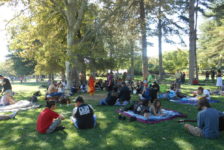
Haley Schiek, Westminster’s newest yoga instructor, teaches a yoga class at the Health, Wellness and Athletic Center at Westminster College. A family friend and mentor inspired her to start doing yoga, which “has become a way for me to creatively express myself,” she said. (Photo by Katie Felice)
Millennials make more commitments to personal improvement than any generation before them, according to a 2015 Pew Research Center study. For some, these personal commitments include dietary choices, workout routines, beauty regiments, life coaching, therapy, buying plants and shopping at farmers markets.
But Laura Iverson, Westminster College’s assistant director of fitness, wellness and recreation, said that while she has noticed students have the “desire” to practice self care, it isn’t necessarily a habit.
“I don’t think it’s what people are doing,” she said. “I think students think it would be a nice idea to meditate and journal, but they don’t do it because they don’t have time for it. In our 20 minutes of spare time we are scrolling through social media, looking at things we should do. It’s so easy to get sucked into [it].”
One study from the ERIC Institute of Education Sciences found that the millennial interest in self care is linked to internet use. Some find inspiration in social media posts but it may be a comparison game for others.
Though Iverson said millennials are not always practicing self care, she said she thinks social media has made the concept popular among the generation.
“It can be as simple as taking 10 slow breaths to reset yourself. It can be as easy as saying ‘No’ to something and taking a moment of stillness.” — Haley Schiek, Westminster’s newest yoga instructor
“If I go to a party and say I am a fitness instructor and I teach yoga, people are like, ‘Oh my gosh cool,’” Iverson said. “Social media has kind of made it cool, because when I was going to school to get my masters in exercise physiology people were like, ‘What are you doing with your life? How will you make a living?’ Back then nobody had a trainer… now everybody has a trainer.”
Despite the increased interest, Iverson said she doesn’t think millennial students in particular are actually using self care as a way to manage stress.
“The life of a student is, stay up late, [drink] a lot of caffeine [and eat] a lot of processed food,” she said. “It’s convenient.”
Though Iverson said she understands how busy students’ lives can get, she noted a few tips for stress management, nutrition and fitness — including journaling, meditation, getting eight to nine hours of sleep, meal planning and meal prepping.
“I always tell students, ‘You have these practices as a practice,’” she said. “You make it a habit when you’re not stressed, so then when you do come upon stress in your life, you have this thing to fall back on.”
To find out more about this phenomenon, The Forum interviewed several students on campus to discover what activities and strategies they use to practice self care.
Taking a moment to smile
Haley Schiek, a sophomore and yoga instructor at Westminster, said self care can be harder than it looks.
“I think the media definitely makes it look easier and more appealing to give yourself self care than it really is,” she said. “I can totally attest to it. I’m all like, ‘Care about yourself, be nice to yourself, give yourself a break’ and then when it comes to myself, it can be so hard to actually consistently do that.”
Schiek said she wants students to understand that taking time for yourself doesn’t always have to be time consuming or complicated.
“It doesn’t have to be so drastic as taking an hour of yoga class or a bubble bath,” Schieck said. “It can be as simple as taking 10 slow breaths to reset yourself. It can be as easy as saying ‘No’ to something and taking a moment of stillness.”
One strategy Schiek said works best for her is simply smiling — especially when it makes others do the same.
“[It can be as simple as] sitting in a class that you hate and just turn the corners of your mouth up and say, ‘Yeah, I hate this. But I’m here.’ And that’s it,” she said. “You just accept. It changes the brain chemistry to smile or to make someone else smile.”
Climbing
Harrison Buck, a senior climbing instructor on campus, facilitates the wall and works one-on-one with people who want to try the sport.
“I would say I climb almost every day to some extent,” Buck said. “When I’m not climbing, I’m practicing technical skills or working out my climbing muscles.”
Alex Arnis, a senior who is also a climbing wall instructor on campus, said he has been climbing for roughly four years.
“When I started climbing it was kind of [a stress reliever], but I think that’s slowly how it starts out — but then it quickly becomes a bigger aspect of your life,” he said. “It’s cool having these other types of goals that are not only centered around school or a job.”
Buck and Arnis both said it is not only the physical aspects of climbing they enjoy but also the environmental element.
“The biggest stress relief for me in climbing is being able to go outdoors and find a really beautiful landscape,” Buck said. “The general activity of climbing is a great way for me to focus on one thing at a time. When I’m climbing, I’m only thinking about my move and where I’m going next. I’m not really thinking about a paper I have due that night.”
Wellness Support Group
Lisa Jones, director of counseling at Westminster said, it is important to remember emotional self care as well as physical care.
“For any of us to function well and be able to be ourselves and make progress toward our goals, self-care is essential,” Jones said in an email to The Forum. “Emotional wellness is an important aspect [of self-care] along with the other dimensions — physical, spiritual, social [and] intellectual. The dimensions of wellness are interactive and impact each other.”
Westminster’s Counseling Center is currently offering a Wellness Support Group, where people can come to discuss any type of support they need, whether it be relationships, anxiety, depression or stress.
Molly Butterworth, a counselor, said in an email to The Forum that the group is a, “safe, supportive, non judgemental place in which participants can give and receive support,”
“I think it has created a supportive space for students to understand they are not alone in their struggles and a place to work on gaining insight into themselves and ways of taking care of themselves through self-compassion and healthy coping skills,” Jones said in her email. “It is important to seek counseling or other professional help if the issues are causing emotional distress or are interfering in completing daily activities and goals.”
Jones’ advice for busy students? Start small.
“Sometimes relatively small changes can help, like remembering to eat breakfast or staying hydrated, along with things like moving more (taking the stairs or parking further from your destination), talking with a friend or family member, remembering it is a sign of strength to be able to ask for help or making a list of accomplishments for the day,” she said.









